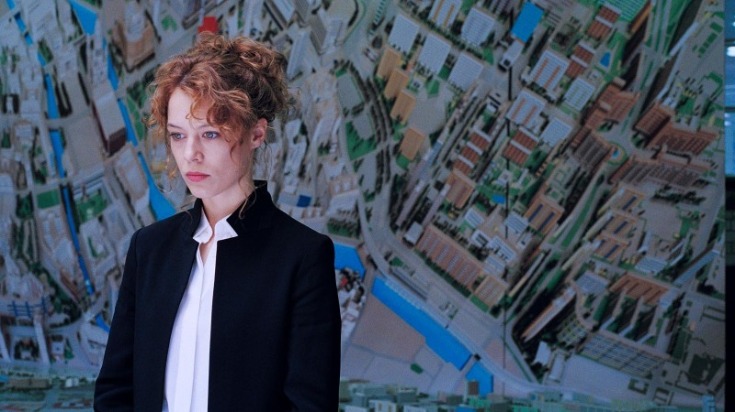Christian Petzold’s Undine

Christian Petzold is such a confident and accomplished stylist that his films become all the more effective when the narratives up-anchor from the world as we know it and begin to follow a dream logic of their own. This happens a bit in Ghosts, the 2005 film inspired by a tale from the Brothers Grimm, and quite a lot in Yella (2007), in which a woman does not see her life flash before her eyes at a perilous moment, but instead sees what seems to be a feature-length flash forward to what might have been. Undine, premiering in competition at the Berlinale, is a contemporary reimagining of the myth of the water spirit, the ur-mermaid first dreamed up by the sixteenth-century alchemist Paracelsus and reappearing in literary works by writers as varied as Friedrich de la Motte Fouqué and Ingeborg Bachmann. And of all of Petzold’s theatrical features, Undine is the least moored to reality.
The very first scene hints at things to come, opening just moments after Undine (Paula Beer) has been told by her cad of a boyfriend that he’s found someone else. Her response: “If you leave me, I’ll have to kill you.” Wherever—and whenever—she comes from, that’s the rule. Only the love of another has given her human form. Fortunately for her (and for the time being, for her ex as well), it isn’t long at all before a truer, deeper love is flushed to life by a torrent of water and broken glass—not unlike the one that sets Yella in motion—rushing over Undine and Christoph (Franz Rogowski) the moment they meet. Christoph is an underwater welder who’s been working in a flooded town at the bottom of a lake where he spies a mysteriously wise-looking two-meter-long catfish. Undine’s day job is to introduce the elaborate models of Berlin on display at the City Museum and to talk visitors through the history the city built on marshlands, much of which she may have lived through herself in one form or another.
Beer and Rogowski were first paired in Petzold’s Transit (2018), a disturbingly realistic vision of a parallel present day in which fascists are rapidly taking over the European continent. Petzold found his two leading actors electric together, and as he’s told several interviewers, he was getting a little melancholic toward the end of the shooting of Transit in Marseilles. So in the very pizzeria we see at the end of Transit, he sat Beer and Rogowski down at a table and told them the story of Undine, setting this new project in motion. What Undine lacks, though, is the cohesiveness of the alternative realities of Yella and Transit. In Yella, one strange event leads to the next as if someone were freely associating in a state somewhere between wakefulness and sleep. Transit lays down a few ground rules—no mobile phones, no laptops—and sticks to them rigorously. Undine brings in more magic—a crucial but ultimately impossible phone call, for example—which has the paradoxical effect of making the film less magical.
At least on first viewing. Scene by scene, Undine is never less than enthralling. With cinematographer Hans Fromm, who has been working with Petzold since the director’s film school graduation project, Pilots (1995), Petzold stages and shoots a scene as simple as a couple walking through a city or a sequence as complexly choreographed as the one that eventually positions a man and a woman side by side, facing each other, on the floor of a café as an aquarium explodes all over them with breathtaking precision. Conversations I’ve had over the years with critics, German and non-German alike, have proven that first impressions of a new Petzold feature can be remarkably similar. Yes, Jerichow (2008) is unquestionably well-made, but it’s no Yella. Phoenix (2014) is certainly solid, but it’s no Barbara (2012). And then you live with these new films for a while, their images and sequences reemerging in the mind over and again, and the realization sets in that, yes, each new addition to the oeuvre is as remarkable as the films that preceded it. I suspect that Undine will soon be following the same trajectory.



